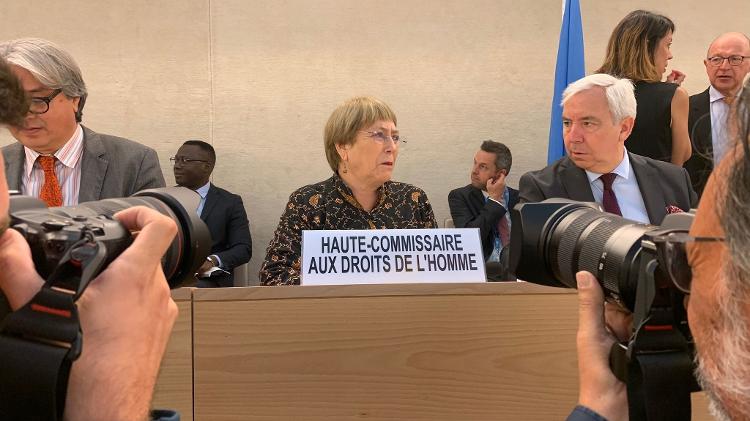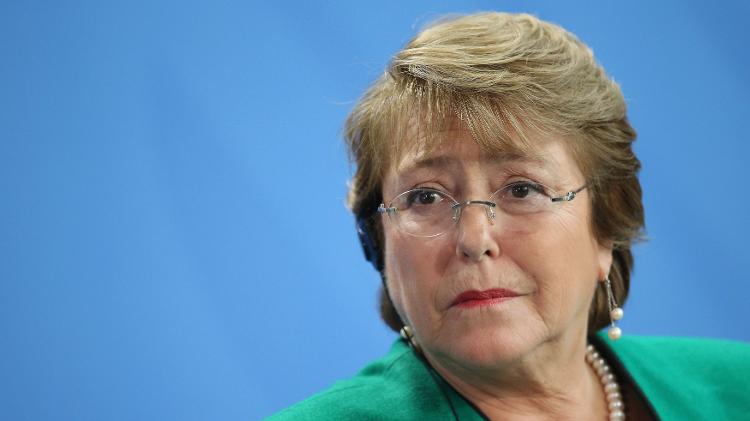The world and Latin America miss Brazil. A country that speaks for the developing world and defends the interests of the entire world’s population. The UN (United Nations) High Commissioner for Human Rights, Chilean Michelle Bachelet, who made the assessment, resigned four years later, condemning violations in various parts of the world, including Brazil.
HE UOL It was the only media outlet in the country to interview him privately before he left his post. In a long conversation on the shores of Lake Leman in Geneva, Chile’s former president also warned of the risks to democracy, and once again condemned President Jair Bolsonaro’s (PL) attack on the ballot boxes. electronics and judgment. According to him, Brazil is known for having clean elections and for such criticisms to be “unjustified”.
Here are the main parts of the speech:
Human rights violations have always existed in Brazil. But what happened in the last four years?
My impression is that there is likely to be an increase in human rights violations, especially in certain sectors. Attacks on journalists, increased racism, as well as the encouragement of corporate presence on indigenous soils are driving the rise of illegal mining. All this without a response from the government. Rather, it was accompanied by the killing of human rights defenders and indigenous people.
In some cases, it is government policies that can lead to violations. And on the other hand, the absence of responses to current situations. All this turns into human rights violations.
It’s the increase in police violence we’re still seeing. We started a report on racism when there was the murder of George Floyd in the USA, and one of the cases we looked at was Brazil. We spoke to families and they didn’t just tell us about the unjust deaths of young Afro-Brazilians. But also the absolute lack of answers to family. This is a pattern we see in other countries as well.
What the state needs to do is to develop policies that ensure that everyone has the same rights against this systemic racism.
We saw a government in Brazil that refused to admit that there was a coup in 1964: the unwillingness to recognize crimes of the past produces a scenario to what extent these crimes can be justified today? ?
When access to justice, truth, and reparations are not followed by the suffering created by dictatorships, we see that these sufferings continue in a society. This makes reconciliation very difficult. Those responsible for the pain I have experienced believe that time will erase them. They believe that families will one day not exist and that this will disappear. But it is not. This pain continues in family, friends and is passed down from generation to generation.
That was the bet in Chile, and we saw that it wasn’t. Wounds do not heal quickly when contaminated. It takes much longer and is not always a good recovery. In some cases, they reopen. When problems are not addressed in a society, it can lead to suffering and even violence. This also affects the credibility of democracy.
It is essential that there be a process of truth, justice, and reparation. We need to learn lessons not to repeat things. There are those who say that everyone can make mistakes. Therefore, they can be repeated. But we’re talking about fears, not mistakes.
In the case of Brazil, does the amnesty law still make sense?
I don’t know the details of the Brazilian case. But in Chile we had a wide discussion about this. We needed to know the truth. Transition processes can be different. There is no single model. The important thing is that the process ensures that the country knows the truth. It is essential to deal with this past and see the best path for Brazil.
In Brazil, we are in the middle of an election campaign in the country. How important is this choice? Is something bigger at stake?
Brazil is a very important country in the world. Historically, it has played an important role as a strong voice to support the voice of the rest of Latin America. And that voice is missed. This guide, which has a very important position of Brazil in the world, tries to influence developing countries so that they have better opportunities and their voices are heard. And we haven’t seen that in recent years.
In terms of the world and the region, (the desire) is that Brazil can have a future government – clearly democratic – not only to satisfy the aspirations of all Brazilians so that their rights are promoted and protected. But it can play a much-needed international role, and we’re missing it.
We know that there is political polarization in the elections. It is natural for parties to present government plans that may criticize a different government program. However, all this must be done in an atmosphere of understanding and respect that democracy requires looking at the other as a political adversary. But not as anti-patriotic or anti-patriotism.
A serious discussion is needed. And do not inflame hatred towards others or indulge in personal stigma. It is very serious when a head of state urges his supporters to demonstrate against the judiciary, against the electoral system, with a violent speech.
Brazil is a country that has shown itself to be a country with respectable, clean and transparent elections in general. It was never fundamentally questioned for this. Such criticisms are not justified. But to encourage marching against another state power? You may disagree with another force. But doing this is not good for democracy. It can escalate violence as we’ve seen elsewhere in the world.
This is not just a one-person conversation. There is also the social environment, physical attacks against individuals. This creates an atmosphere of violence that can be very serious.
And could this momentarily open Pandora’s box after the election?
It depends on the country. For this reason, however, it is important that elected leaders are able to sound calm and peaceful throughout the process. We haven’t seen this much in Latin America, but we’ve seen sexual violence, murder and assault elsewhere. And this is a very serious situation and can be avoided if political leaders maintain an appropriate tone and speech that does not encourage hate speech and violence. But it is a speech that allows to define the difference between people and therefore all Brazilians can go to vote with calm and faith. That your choice (your policy) will not put you at risk. Passion is part of that, especially in Brazil. But to think that it could turn into violence is a very serious thing.
What will not happen is that a discourse of violence could provoke some actors, such as the police, to act in a certain way against an opposition candidate. This can not be.
Are you currently making any objections to Brazil?
I appeal to all those responsible, all candidates and parties, in government or not, so that we can carry out a legitimate election process in peace. With enthusiasm and passion.
But to do everything possible to avoid hate speech, to avoid incitement to violence and other issues such as racism and discrimination against the poorest. Trying to be a democratic campaign. And democratic means all of this together.
In recent years, we have seen leaders with an authoritarian profile who use the tools of democracies to come to power. Is democracy today threatened by this phenomenon?
Today, democracy is challenged not only by democratically elected people, but also by people who, when they come to power, use a form of relationship with the authoritarian society. No openness to dialogue and no consultation to understand people’s demands. Often with forceful responses to peaceful protests. Or try to enact laws restricting democratic areas and freedom of the press with excuses such as pandemic or terrorism.
Is this the only element of the crisis of democracy?
There is another aspect. We have seen demonstrations in more than 80 countries prior to the pandemic. People were on the streets for different themes, lack of social and economic rights, living conditions, high food prices. In fact, we are seeing this again now with the war in Ukraine, which will lead to many social protests. Inflation will put people in a difficult position.
We have seen the reliability of institutions. Not just elected leaders. But it is also a questioning of the judiciary, the police, the whole structure of society. The assessment for these people was that democracy did not deliver the expected results in terms of improving lives.
Democracy is not just electing people. But how do chosen people make life better? What has happened is that for many people, credibility has been lost in politics and institutions. There is no answer to impunity, people do not always get justice. So there is a global questioning about democracy. Not just for the authoritarian use of some leaders, but for the lack of results.
in what way?
People are asking themselves: Does voting really make a difference? Won’t it improve my life? Or they say a politician forgets people when the election is over. The truth is that people today expect more from democracy. Just voting is not enough. But being a part of decision making is being informed. This can be at the local or national level. There is a crisis of democracy. There is still a lack of trust in the economic system, because in its current form, it will not improve people’s lives.
Even before the pandemic, the gap between the poor and the rich has widened. Now we have a pandemic and a war that has hit the whole world with inflation. Many countries thought they could recover their economies once the pandemic was under control. But they are very impressed.
Therefore, leaders need to take all this into account. But for this, the same leaders cannot question or disband institutions. But strengthen them.
We still haven’t seen all the consequences of war, and in the same way as the response to the epidemic, we will have to think about how to respond to it by helping people and especially the most vulnerable.
source: Noticias

